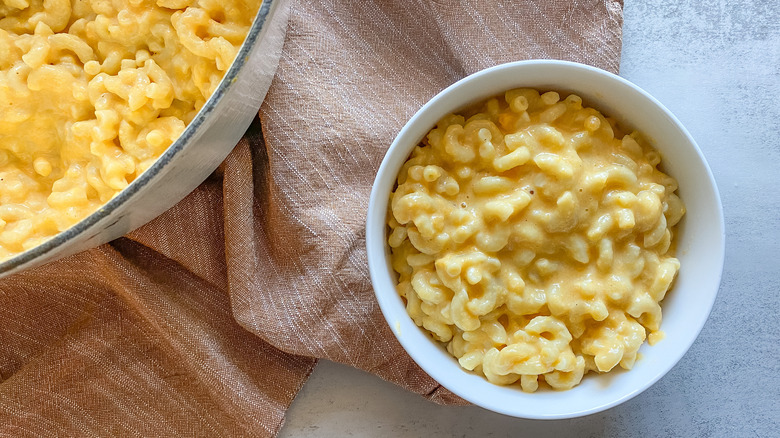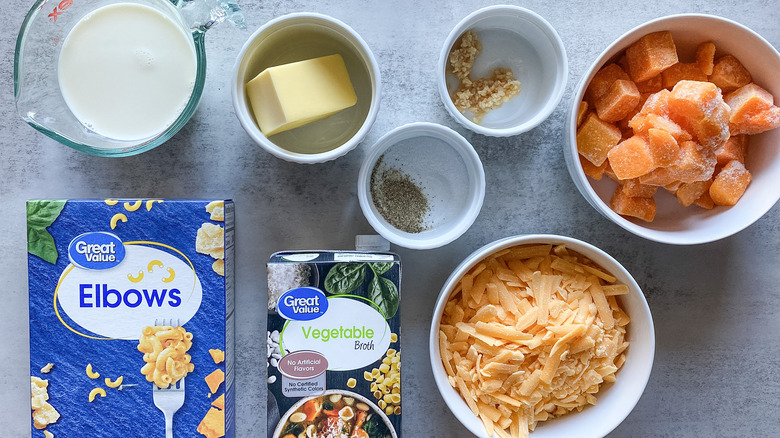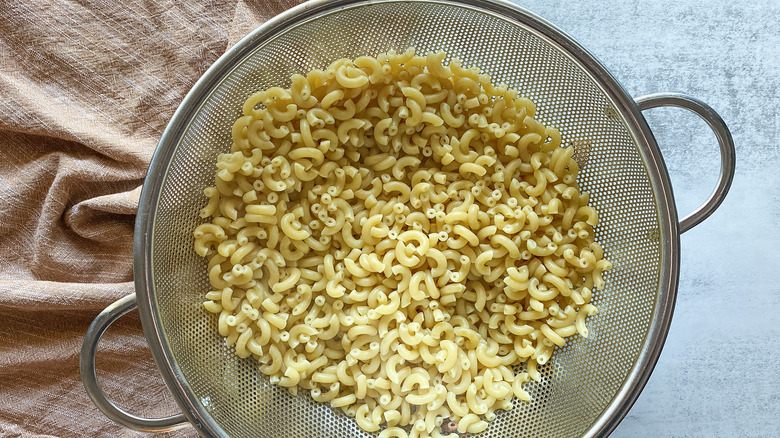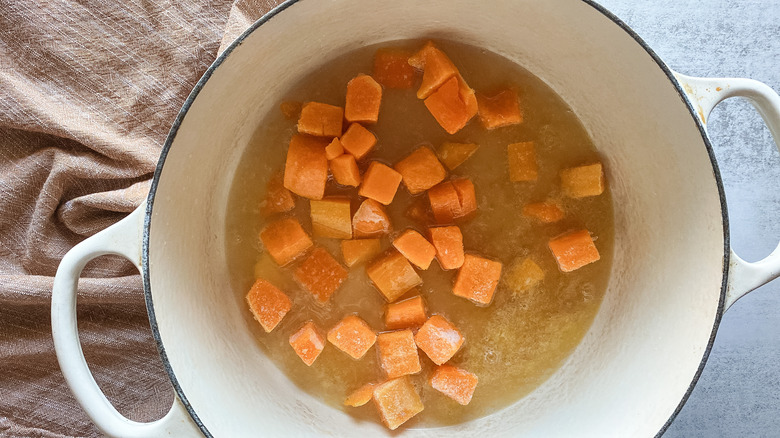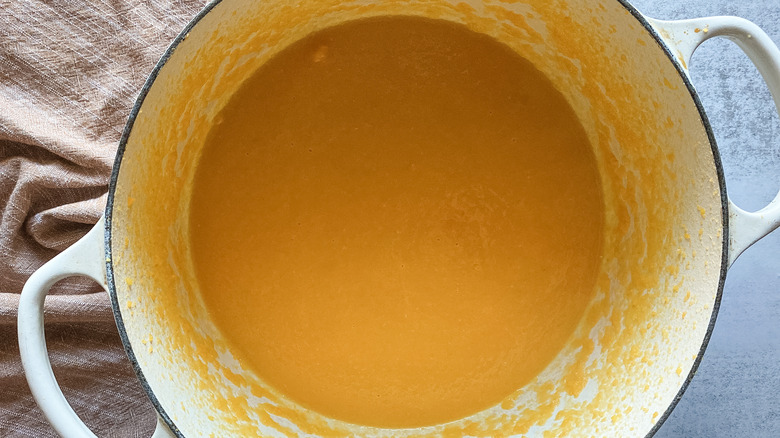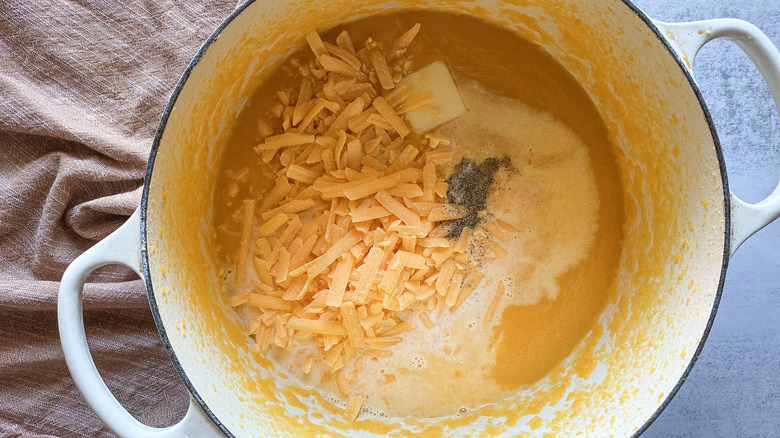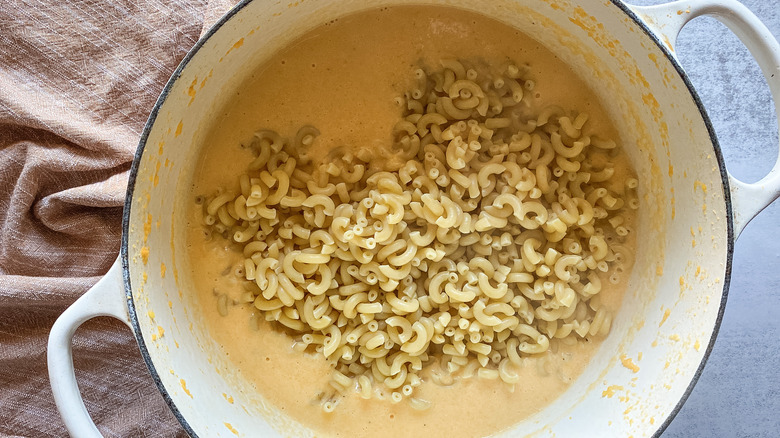Butternut Squash Mac And Cheese Recipe
There is no easier way to reach the recommended 2 to 3 cups of vegetables a day than by adding it into a dish, like a sauce. Recipe developer and registered dietitian nutritionist Kristen Carli, MS, RD notes, "This mac and cheese recipe is the perfect comfort food that simultaneously sneaks in a little extra vegetable for added nutritional value." The addition of butternut squash into this classic dish creates a velvet texture that will have you coming back for more. This dish is kid-friendly and adult-approved, making it such a great meal to whip up for the whole family.
Not able to consume gluten? No problem. "The best part about this dish is that you can substitute the elbow macaroni for any type of pasta that works best for your dietary needs," Carli says. As a side or the main entrée, this mac and cheese will surely steal the show. With butternut squash available year-round, this simple recipe can be made any time the craving hits.
Gather your ingredients for butternut squash mac and cheese
It's time to gather the ingredients to prepare this cheesy dish. You will need elbow macaroni, salted butter, garlic, frozen cubed butternut squash, vegetable broth, whole milk, cheddar cheese, salt, and pepper. This recipe is easygoing in the sense that you can make so many alterations to it and achieve the same delicious dish. For example, if you cannot find frozen squash at the supermarket, feel free to substitute for canned or fresh. If you cannot consume dairy, you can easily sub in a dairy-free alternative.
Boil the pasta
In a large pot, add water, and bring to a boil. Once boiling, add a pinch of salt to keep the noodles from sticking. Depending on the pasta you have purchased, follow the directions on the package and cook accordingly. Gluten-free pasta tends to cook a lot quicker than pasta with gluten in it, so pay close attention to not overcook your pasta. (After all, no one likes a gummy pasta texture.) Once cooked, drain and set aside.
Sauté the butternut squash
Grab an additional large pot. Over medium heat, add the butter and garlic, and sauté until fragrant, one to two minutes. Next, add your frozen butternut squash and vegetable broth, and bring to a boil. Once boiling, lower the heat, and let the mixture simmer for five minutes. If using fresh cubed butternut squash, you may need to increase the cooking time to about 15 minutes of simmering before blending. Once the squash is soft in texture, it's time to blend. If using canned butternut squash, prepare this step in the same manner.
Blend the squash
If you don't have an immersion blender on hand, that's totally okay. Simply purchase canned pureed butternut squash. Skip the blending process altogether, and instead, whisk the ingredients well. You can also transfer your ingredients to a regular blender — just be careful during the transfer, as the mixture will be hot at this point in the cooking process. (Also be sure to follow the proper safety precautions when blending hot contents in a blender.)
As per Carli, "Canned and frozen vegetables can be just as nutritious as fresh vegetables, because the process of canning preserves many nutrients."
Add the dairy
Once the squash is fully blended, slowly add the milk, butter, and cheese to the stockpot, and stir. Don't forget to add the salt and pepper. If you are dairy-free, there are so many great alternatives to choose from. You can easily swap out the cow's milk for an unsweetened soy or nut milk option. Same goes for the butter and cheese — there are plenty of non-dairy butter and cheese options out there. Sometimes vegan cheese may have a bad rap, however, when you melt vegan cheese into a dish that has so much flavor to offer like this recipe, you will not be able to taste the difference.
Add the pasta
When the butternut squash sauce is ready — aka the cheese is nice and melted — add the pasta to the stockpot. Slowly mix until every noodle is nicely coated with butternut squash deliciousness. The sauce may seem thin at first, but do not worry, because it will thicken quickly over time. And if the sauce becomes too thick, it can easily be thinned out — just add water or vegetable broth slowly until the consistency of your liking.
We doubt you'll have any mac and cheese left over, because this dish is so darn delicious. But if you do, Carli notes that this recipe stores well as leftovers and can easily be reheated.
Butternut Squash Mac And Cheese Recipe
This butternut squash mac and cheese recipe is the perfect comfort food that simultaneously sneaks in a little extra vegetable for added nutritional value.
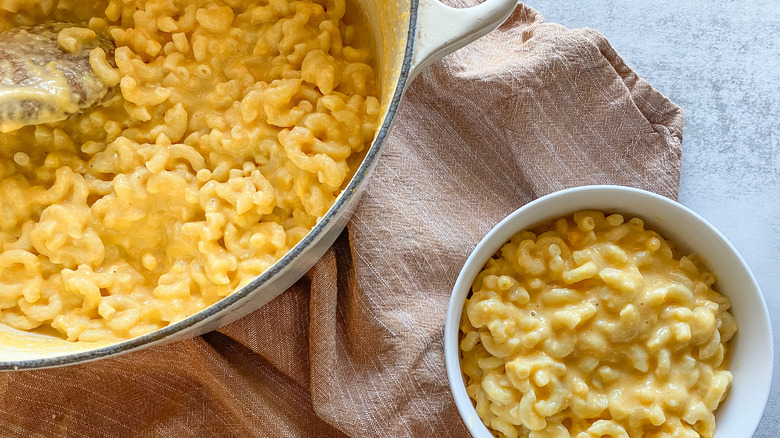
Ingredients
- 1 pound elbow macaroni
- 4 tablespoons salted butter, divided
- 1 tablespoon minced garlic
- 10 ounces frozen cubed butternut squash
- 1 ½ cups vegetable broth
- 1 cup whole milk
- 2 cups shredded cheddar cheese
- 1 teaspoon salt
- ½ teaspoon pepper
Directions
- Bring a large pot of water to a boil. Add the pasta, and cook according to package directions, about 9 minutes. Drain, and set aside.
- In a large stockpot over medium heat, add 2 tablespoons of butter. Then, add the garlic, butternut squash, and vegetable broth. Bring to a boil, and lower to a simmer for 5 minutes.
- Using an immersion blender, blend the squash and broth mixture until very smooth.
- Add the milk, remaining 2 tablespoons of butter, cheddar cheese, salt, and pepper. Stir over medium heat until the cheese melts, about 5 minutes.
- Add the drained pasta to the cheese sauce. Stir well.
Nutrition
| Calories per Serving | 551 |
| Total Fat | 23.0 g |
| Saturated Fat | 13.1 g |
| Trans Fat | 0.8 g |
| Cholesterol | 62.8 mg |
| Total Carbohydrates | 65.1 g |
| Dietary Fiber | 3.5 g |
| Total Sugars | 5.3 g |
| Sodium | 625.7 mg |
| Protein | 20.9 g |
